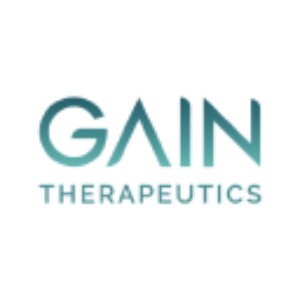Gain Therapeutics Presents New Preclinical Data Demonstrating Potential Disease Modifying Benefits of its Novel Brain Penetrant Small Molecule Candidate GT-02287 in Two Preclinical Models of Parkinson’s Disease
Rhea-AI Summary
Gain Therapeutics (Nasdaq: GANX) presented preclinical data on GT-02287 at the International Congress of Parkinson’s Disease and Movement Disorders 2022 Annual Meeting. Results demonstrated a significant dose-dependent improvement in lysosomal health and fine motor skills in Parkinson’s disease models. GT-02287 shows promise in neutralizing CBE-mediated neurodegeneration and enhancing neuronal survival. This research indicates the potential for GT-02287 as a first-in-class disease-modifying therapy, aiming to restore enzyme function in Parkinson’s patients.
Positive
- GT-02287 shows statistically significant improvements in lysosomal health and fine motor skills in Parkinson's disease models.
- Potential disease-modifying properties of GT-02287 may halt disease progression by restoring enzyme function and enhancing cell survival.
Negative
- None.
News Market Reaction
On the day this news was published, GANX declined 7.39%, reflecting a notable negative market reaction.
Data tracked by StockTitan Argus on the day of publication.
Treatment with GT-02287 Resulted in a Significant Dose-Dependent Improvement of Cellular Lysosomal Health and Fine Motor Skills
Results Presented at the International Congress of Parkinson’s Disease and Movement Disorders 2022 Annual Meeting in Madrid, Spain
BETHESDA, Md., Sept. 19, 2022 (GLOBE NEWSWIRE) -- Gain Therapeutics, Inc. (Nasdaq: GANX) (“Gain”, or the “Company”), a biotechnology company transforming drug discovery with its proprietary computational drug discovery platform identifying novel allosteric binding sites and creating small molecule treatments, today announced the presentation of new preclinical data at the International Congress of Parkinson’s Disease and Movement Disorders 2022 Annual Meeting in Madrid, Spain, evaluating the neuroprotective effect of Gain’s lead ‘Structurally Targeted Allosteric Regulator’ (STAR) compound, GT-02287, in preclinical in vitro and in vivo models of Parkinson’s disease.
The results from these latest in vitro and in vivo studies are consistent with previous data presented by the Company and demonstrate statistically significant, dose-dependent effects of GT-02287, the Company’s lead compound for the treatment of Parkinson’s disease. First, by protecting against key pathophysiological hallmarks of Parkinson’s disease, including neurite and lysosomal pathology, and second, by reducing fine motor skill impairment in mice (Wire Hang Test) in conduritol β-epoxide (CBE) models designed to mimic the neurodegenerative effects of Parkinson’s disease.
“We are especially excited by these latest data which expand on the accumulating preclinical evidence supporting the potential disease-modifying properties of our novel small molecule candidate, GT-02287,” said Joanne Taylor, Ph.D., Senior Vice President of Research at Gain Therapeutics. “Collectively, the body of preclinical data that has been generated is highly encouraging as it shows that GT-02287 may be able to intervene early in the disease process by restoring proper enzyme function and lysosomal health, thereby improving cell survival with the goal of ultimately halting disease progression. If these results are supported in future clinical studies, GT-02287 could become an important first-in-class disease-modifying therapy for Parkinson’s disease.”
Summary of the Preclinical Data
In a poster presentation on September 17, 2022, entitled “GT-02287, A Brain-penetrant Structurally Targeted Allosteric Regulator of Glucocerebrosidase Shows Evidence of Pharmacological Efficacy in Conduritol β-epoxide (CBE) Models of Parkinson’s Disease,” Gain scientists showcased new preclinical data evaluating the neuroprotective effects of GT-02287 following CBE administration.
In the first study, the ability of GT-02287 to neutralize CBE-mediated neurodegeneration was evaluated in rat mesencephalic neurons. In this study, CBE (100 µM) was applied followed by administration of GT-02287 at either 4 or 24 hours post CBE insult at doses of 1 µM or 12.5 µM. Three days following insult with CBE, neuronal cultures were fixed and stained for tyrosine hydroxylase (TH), a marker for dopaminergic neurons. Neuronal survival, neurite network and lysosomal health (LAMP-2 staining) parameters were all evaluated. The results showed that GT-02287 produced a statistically significant therapeutic effect on both the mesencephalic neurite network and overall lysosomal health, supporting results from earlier preclinical studies showing that enhancement of lysosomal glucocerebrosidase (GCase) activity by GT-02287 protects against the key pathophysiological hallmarks of Parkinson’s disease.
In a follow-up behavioral assessment study evaluating the neuroprotective effects of GT-02877 in a mouse CBE/α-synuclein model, mice were bilaterally injected with α-synuclein preformed fibril (PFF) into the striatum and administrated daily for fifteen days with the CBE (intraperitoneally) and GT-02287 treatment (orally, once per day) at doses of 30 mg/kg, 60 mg/kg or 90 mg/kg for fourteen days. Fine motor skills were then assessed (ability to grasp and hang onto a wire) and compared to results from vehicle control and untreated animals. At each dose level and in a dose-dependent manner, GT-02287 demonstrated statistically significant improvements in locomotor deficits compared to CBE/α-synuclein-injured animals, confirming the neuroprotective benefit observed in vitro in this industry standard Parkinson’s disease in vivo locomotor model.
Through its proprietary SEE-Tx® platform, Gain has identified GT-02287, the Company’s lead compound for Parkinson’s disease, which has the ability to restore the function of GCase, the misfunction of which is implicated in various neurodegenerative diseases. The compound has been characterized in numerous assays and showed the potential to halt disease progression in Parkinson’s patients with GBA1 gene mutations as well as patients whose glucocerebrosidase (GCase) protein was misfolded due to ageing cellular processes. This work was supported through grants from The Michael J. Fox Foundation (MJFF) and the Silverstein Foundation for Parkinson’s with GBA and certain of its findings have been presented by Gain scientists and collaborators at previous medical conferences.
The poster presented from the MDS Congress in Madrid is available on the Science & Technology section of the Company’s website at https://www.gaintherapeutics.com/science-technology/posters.html.
About Parkinson’s Disease
Mutations in the GBA1 gene, encoding the lysosomal enzyme GCase, represents the most common genetic risk factor for Parkinson’s disease (PD). Impaired GCase function has garnered attention due to its association with α-synuclein pathology in GBA-associated PD patients, and also in sporadic PD, as well as in related α-synucleopathies. Although less investigated, decreased GCase levels and activity are also implicated in the pathophysiology of Alzheimer’s disease (AD). Enhancing the activity of mutant and wild-type GCase may represent a therapeutic strategy for the treatment of a range of neurodegenerative diseases.
About Gain Therapeutics, Inc.
Gain Therapeutics, Inc. is transforming drug discovery with its proprietary computational discovery platform identifying novel allosteric binding sites and creating small molecule treatments to address unmet medical needs. The ability to identify never-seen-before allosteric targets on proteins involved in diseases across the full spectrum of therapeutic areas provides opportunities for a range of drug-protein interactions, including protein stabilization, protein destabilization, targeted protein degradation, allosteric inhibition, and allosteric activation. Gain’s pipeline spans neurodegenerative diseases, lysosomal storage disorders, and oncology. Gain’s lead program in Parkinson’s disease has been awarded funding support from The Michael J. Fox Foundation for Parkinson’s Research (MJFF) and The Silverstein Foundation for Parkinson’s with GBA, as well as from the Eurostars-2 joint program with co-funding from the European Union Horizon 2020 research and Innosuisse. For more information, please visit https://www.gaintherapeutics.com.
Cautionary Note Regarding Forward-Looking Statements
This press release contains "forward-looking statements." All statements that are not statements of historical fact are, or may be deemed to be, forward-looking statements. In some cases, you can identify these statements by forward-looking words such as "may," "might," "will," "should," "could," "expect," "plan," "anticipate," "believe," "estimate," "predict," "potential" or "continue," the negative of these terms and other comparable terminology. These statements include, but are not limited to, statements regarding the potential disease-modifying properties of GT-02287; the ability of GT-02287 to intervene in the disease process, improve cell survival and halt disease progression; future clinical studies; the potential of GT-02287 as a first-in-class disease-modifying therapy for Parkinson’s disease; the potential of enhancement of the activity of mutant and wild-type GCase as a therapeutic strategy for neurodegenerative disease; and the development of the Company's pipeline. Any forward-looking statements are based on management’s current views and assumptions and involve risks and uncertainties that could cause actual results, performance, or events to differ materially from those expressed or implied in such statements. These risks and uncertainties include, but are not limited to, the risks that the Company’s preclinical programs do not advance or result in approved products on a timely or cost effective basis or at all; the results of early clinical trials not always being predictive of future results; the cost, timing and results of clinical trials; that many product candidates do not become approved drugs on a timely or cost effective basis or at all; the ability to enroll patients in clinical trials; possible safety and efficacy concerns; and the impact of the ongoing COVID-19 pandemic on the Company’s business. For a discussion of other risks and uncertainties, and other important factors, any of which could cause the Company’s actual results to differ from those contained in the forward-looking statements, see the section titled "Risk Factors" in the Company’s Annual Report on Form 10-K for the year ended December 31, 2022, as filed with the Securities and Exchange Commission on March 25, 2022, as well as discussions of potential risks, uncertainties, and other important factors in the Company’s subsequent filings with the Securities and Exchange Commission. All information in this press release is as of the date of the release, and the Company undertakes no obligation to publicly update any forward-looking statement, whether as a result of new information, future events, or otherwise, except as required by law.
Investor & Media Contact:
Stacey Jurchison
VP, Investor Relations
(410) 474-8200
sjurchison@gaintherapeutics.com
Noor Pahlavi
Argot Partners
(212) 600-1902
Gain@argotpartners.com








